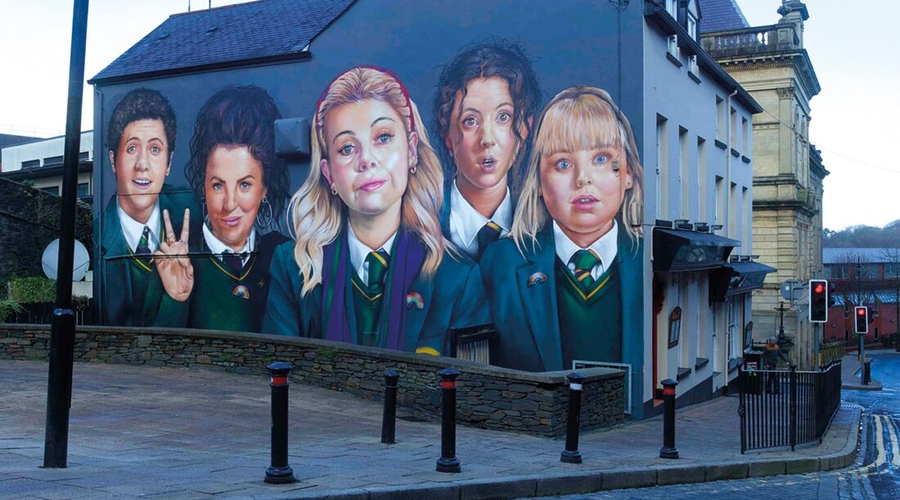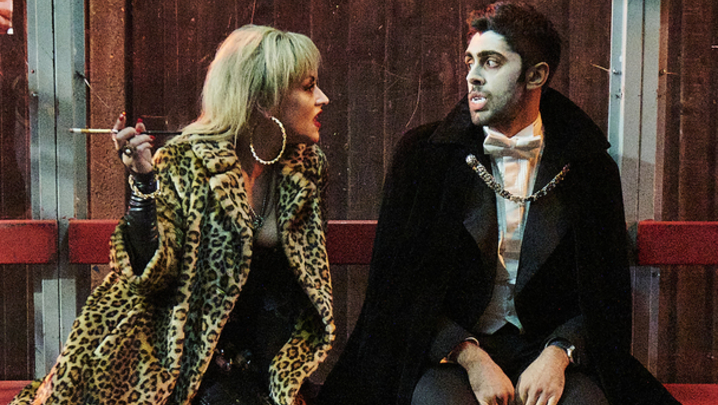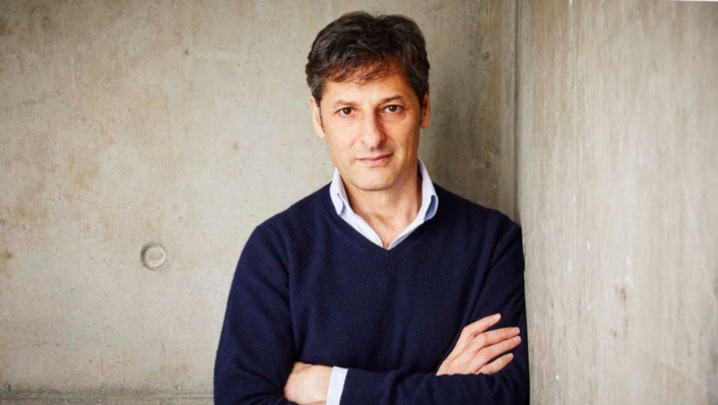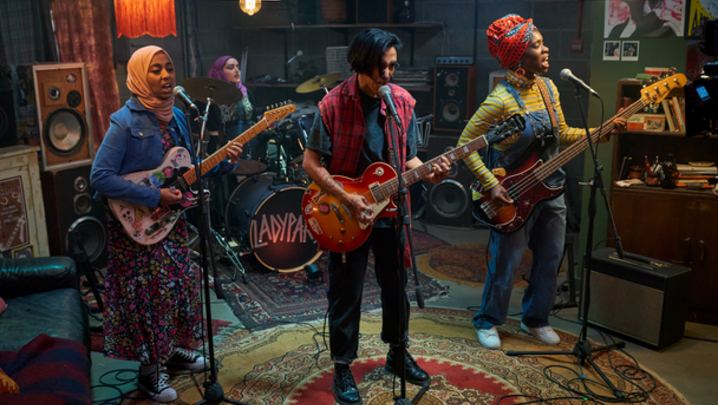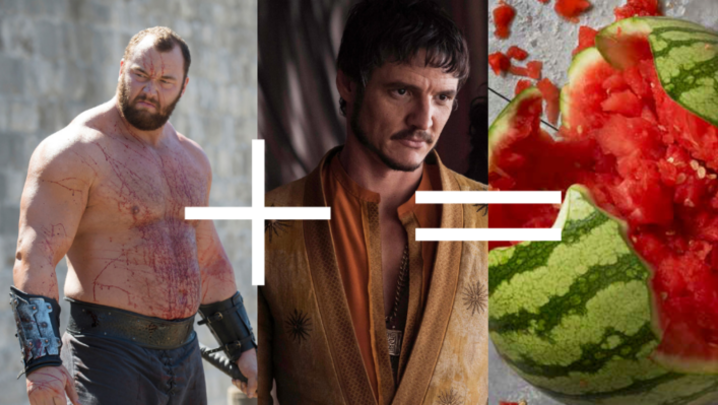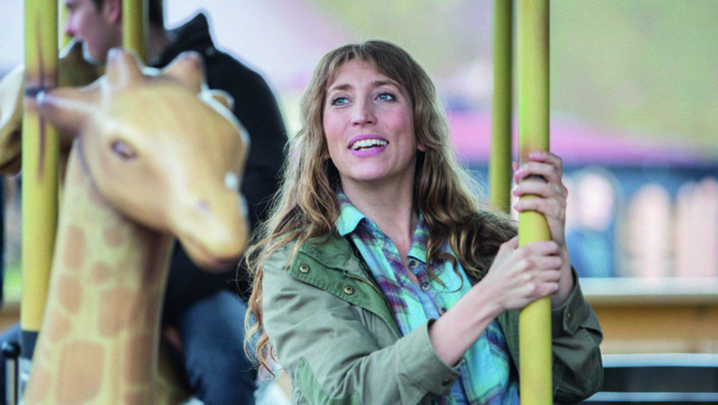Breakout comedy hits are rare, but Lisa McGee wrote one. She explains to Shilpa Ganatra how she did it
Peek around the corner of Badgers Bar in Derry and you’ll see the larger-than-life faces of Erin, Clare, Michelle, Orla and James plastered over the wall. As far as signs of a show’s success go, they don’t get much bigger than a five-metre-high mural.
From the moment the profane and brilliant Derry Girls burst on to our screens last year in a haze of teenage escapades, nostalgic music and 1990s artefacts – such as pastel printed wallpaper, Baby-G watches and armed soldiers on the streets – it captivated its audience.
The first episode drew in 2.5 million viewers and prompted a commission for the second series that is currently airing on Channel 4.
“It still hasn’t sunk in,” says writer and creator Lisa McGee. “It was supposed to be a niche comedy, but now, when I go round Derry with the cast, it’s a shock how famous they are. They’re stopped all the time. It’s different even for me – I was in TK Maxx with my husband recently and someone stopped me and asked me if I wrote Derry Girls. It’s very strange.”
Straight-talking and focused, she is a Derry native who began her wordsmith career writing for local theatre companies. Acquiring both an attachment at the National Theatre and an agent, she moved to London, where she is now based.
"Being able to write full time is so rare, and it’s getting rarer"
“In Derry, putting on plays in pubs doesn’t earn you anything, so I did odd jobs when I could. When I moved to London and got my first writing project, that was me, I didn’t need another job – but I was so lucky,” she reflects. “Being able to write full time is so rare, and it’s getting rarer, I understand from talking to younger writers.
“The National Theatre thing was so amazing. They just went, ‘You don’t need to worry about earning money, we’re going to pay you and give you a space, and you have that time to get something written.’”
It was at this point that she wrote her first TV scripts. They included RTÉ’s restaurant drama Raw and the recently revived play Girls and Dolls. From there, she turned her hand to episodes of The White Queen, Being Human and Indian Summers.
In 2013, Channel 4 premiered her own series, London Irish. Set in the capital, the show about a group of Irish twenty-somethings divided opinions. By contrast, Derry Girls, which she dreamt up when she was pregnant with her first child by writer/actor Tobias Beer, won rapturous reviews. It became Channel 4’s biggest comedy launch since Max and Paddy’s Road to Nowhere in 2004; the series now airs on Netflix in the US, where it has attracted a cult following.
Loosely based on McGee’s childhood at a Derry convent school, in between the gags and the set-ups, the series highlighted the ubiquity of the Troubles in everyday life and, by extension, its normalcy.
Of course, Northern Ireland of yore wasn’t all IRA bombs and angry men on TV, it was also aunts trying to get to the hair salon on time despite bomb scares and pupils having the hots for the soldiers doing checks on the school bus.
While the last season felt like a self-contained six-parter, its continuation sees the gang back together, and trying to chase boys (and girls) and causing headaches for their parents and teachers.
This time, the backdrop of the Troubles has evolved from tragic conflict to a desire for peace – even if the girls’ version is desire for “a piece of fine Protestant arse”, as Michelle, the bolshie one, puts it.
“This year, I felt less worried about the jokes I was making because, last year, nobody batted an eyelid at things I thought were pushing it, such as the Orange Order episode,” says McGee. “This year, there’s an equivalent Protestant gang of boys going through a similar time as the girls, so I could explore and not worry too much – because both sides of the community got it, and that made me feel a bit more confident.”
What doesn’t change is their haplessness – an important point for McGee given the unrealistic characterisation of girls-next-door to date.
"I wanted my characters to be complete disasters because I think that’s what most teenage girls feel like"
“Even in TV shows that I loved, I found the characters that were supposed to be losers were always way cooler than me. Like, I loved My So-Called Life, in which Claire Danes is supposed to be a teenage loser, but she looks like a fashion icon and she gets off with Jared Leto.
“I wanted my characters to be complete disasters because I think that’s what most teenage girls feel like.”
Two of Channel 4’s most successful comedies ever, The Inbetweeners and Peep Show, were edgy shows that extracted comedy gold from excruciating situations. Derry Girls mines similar territory – with one big difference: the central characters are female.
Lately, both the number and quality of female-led comedies have improved. Women’s roles have shifted from being predominantly nagging other halves or mums (the Men Behaving Badly model), to a smattering of awkwardly written lead females (Fox’s New Girl) plus more believable shows, such as Motherland (written by Sharon Horgan and Graham Linehan), Drifters (by Jessica Knappett), Fleabag (Phoebe Waller-Bridge), GameFace (Roisin Conaty) and Catastrophe (another of Horgan’s co-creations). But there’s still a way to go, warns McGee.
“TV hasn’t quite caught up just yet – I think there needs to be a lot more content and choice,” she says. “We’ve picked out some examples but, if we were to talk about male-led shows, we could be here all day. That’s the point that we need to get to, where there’s lots of examples.”
She adds: “Everyone’s now saying that it’s a problem that there are no female writers, there’s not enough female leads, and there’s not enough female comedy.
“Eventually, people are going to have to put their money where their mouth is to challenge this. Channel 4 is very good about that.”
It doesn’t help, however, that, after cancelling Birds of a Feather and Bad Move, ITV has dialed down the amount of original scripted comedy it commissions to zero. “That decision is disappointing,” remarks McGee. “Comedy is not something on the side; it’s skill. I write drama as well, and comedy is different and very tough. The thing that I love about comedy is that people will re-watch it for years.
“Comedy usually works because you recognise something about your life, like in The Royle Family. There’s an intimacy to comedy, and it’s more than just being entertained. But it’s also true that the family can watch comedy together and it’s a shared experience.”
How does she feel the genre might progress in the years ahead?
“There might be more long-form comedies,” she says. “There are really interesting things happening with shows such as Search Party (shown in the UK on E4), where it’s a comedy, but it’s [also] a drama, slower and more twisty-turny.
“I think we’re going to be looking at comedy being more multi-faceted, and [mixing with] other genres such as thrillers.”
Perhaps this vision is an insight into the shows McGee is currently developing. She’s working on three dramas to balance out the comedy-heavy year she had writing series two of Derry Girls.
“After I write a comedy, I immediately want to write something dark because it’s the opposite,” she explains. “So, I have three different ideas at three different stages, but Derry Girls has been a priority for me, so I’ve just been working on them in the background.”
With a third series of Derry Girls looking likely, the dramas may well have to wait a little longer.

